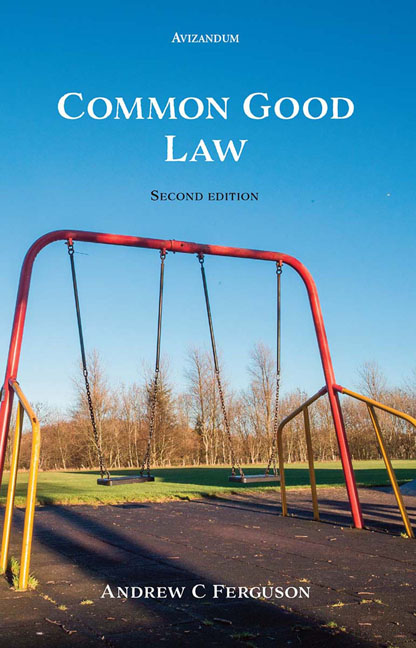Book contents
- Frontmatter
- Contents
- Preface
- Tables of Legislation
- Table of Cases
- 1 Origins and Definitions
- 2 Statutory Framework
- 3 The Administration of the Common Good
- 4 Inalienable Common Good Property
- 5 Classification of Common Good Land
- 6 Appropriation, Alienation and Disposal of Common Good Land
- 7 When Does ‘a Question’ Arise?
- 8 Factors Involved in Allowing Disposal
- 9 Taking a Common Good Case to Court
- 10 Common Good and Community Empowerment
- Appendix I List of Burghs
- Appendix II Disposal, Appropriation and Alienation
- Index
- Frontmatter
- Contents
- Preface
- Tables of Legislation
- Table of Cases
- 1 Origins and Definitions
- 2 Statutory Framework
- 3 The Administration of the Common Good
- 4 Inalienable Common Good Property
- 5 Classification of Common Good Land
- 6 Appropriation, Alienation and Disposal of Common Good Land
- 7 When Does ‘a Question’ Arise?
- 8 Factors Involved in Allowing Disposal
- 9 Taking a Common Good Case to Court
- 10 Common Good and Community Empowerment
- Appendix I List of Burghs
- Appendix II Disposal, Appropriation and Alienation
- Index
Summary
I first heard of the common good as a legal concept in 1989, when I joined Kirkcaldy District Council as a solicitor. In the early months of my new job, common good seemed to be everywhere; each former burgh in the District Council's area possessed titles which were marked in the chartulary as belonging to ‘common good’. It struck me as a very interesting little nugget of property law which was, to me at least, also of practical importance.
Common good is a topic that can lie dormant for quite some time but, as several local authorities have found to their cost, it can produce painful consequences for the unwary, particularly, but not solely, in relation to disposal of land held on the common good.
My research into the subject resulted in the first edition of this book. When that edition was finalised in 2005, it proved more timely than I could have imagined. Common good, from being an obscure corner of local authority law, was starting to hit the headlines.
I can claim no credit for it doing so: the fact that the topic has gained ever greater profile is down to the efforts of many local campaigners, as well as some influential opinion-makers and writers, most notably Andy Wightman (now an MSP).
However, the decision of the Scottish Parliament's Local Government and Communities Committee to write to the Scottish Law Commission in February 2018, and the Commission's con-confirmation that common good law would not be included in its Tenth Programme for Reform, makes this an opportune time for an updated edition.
The main changes in the law covered by this edition include case law (including, but not limited to, the case of Portobello Park Action Group); the provisions of both the Community Empowerment (Scotland) Act 2015, and the Land Reform (Scotland) Act 2016; as well as some consequential changes to other legislation which has a tangential effect on common good.
I have also taken the opportunity to revise, and, I hope, improve on, some other parts of the first edition.
As well as the acknowledgements in the former edition, I would like to thank the Clark Foundation and the Society of Local Authority Lawyers and Administrators in Scotland (SOLAR) who, for a second time, have contributed to the costs of publication.
- Type
- Chapter
- Information
- Common Good Law , pp. ix - xPublisher: Edinburgh University PressPrint publication year: 2020



